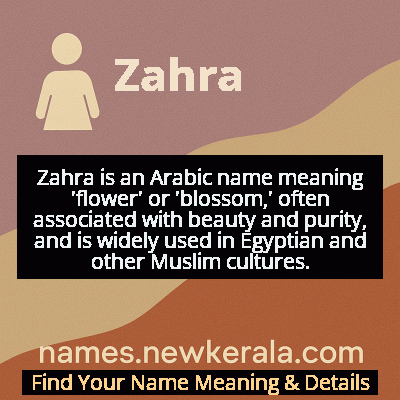Zahra Name Meaning & Details
Origin, Popularity, Numerology Analysis & Name Meaning of Zahra
Discover the origin, meaning, and cultural significance of the name ZAHRA. Delve into its historical roots and explore the lasting impact it has had on communities and traditions.
Name
Zahra
Gender
Female
Origin
Egyptian
Lucky Number
9
Meaning of the Name - Zahra
Zahra is an Arabic name meaning 'flower' or 'blossom,' often associated with beauty and purity, and is widely used in Egyptian and other Muslim cultures.
Zahra - Complete Numerology Analysis
Your Numerology Number
Based on Pythagorean Numerology System
Ruling Planet
Mars
Positive Nature
Generous, passionate, energetic, and humanitarian.
Negative Traits
Impulsive, impatient, moody, and can be overly emotional.
Lucky Colours
Red, maroon, scarlet.
Lucky Days
Tuesday.
Lucky Stones
Red coral, garnet.
Harmony Numbers
1, 2, 3, 6.
Best Suited Professions
Military, sports, philanthropy, leadership roles.
What People Like About You
Courage, energy, leadership, generosity.
Famous People Named Zahra
Zahra Bani
Athlete
Italian javelin thrower who won multiple national championships and represented Italy in international competitions
Zahra Rahnavard
Academic/Activist
Iranian artist, scholar and political activist known for her role in the Green Movement and as former chancellor of Alzahra University
Zahra Joya
Journalist
Afghan journalist who founded Rukhshana Media, an all-female news organization, and was named Time Magazine's 2022 Woman of the Year
Zahra Lari
Athlete
Emirati figure skater, first woman to represent UAE in international skating competitions, pioneering Muslim athlete in winter sports
Name Variations & International Equivalents
Click on blue names to explore their detailed meanings. Gray names with will be available soon.
Cultural & Historical Significance
In Egyptian culture specifically, Zahra embodies both religious devotion and natural beauty, reflecting the country's rich Islamic heritage and ancient appreciation for floral imagery. The name's connection to flowers resonates with pharaonic symbolism where blossoms represented life, renewal, and divine beauty. Throughout Egyptian history, the name has been popular among both Coptic Christian and Muslim communities, demonstrating its cross-cultural appeal. The Nile Valley's agricultural abundance and the importance of flowers in Egyptian ceremonies and decorations have further cemented Zahra's cultural relevance, making it a name that beautifully bridges ancient traditions with contemporary identity.
Extended Personality Analysis
Individuals named Zahra are often perceived as radiant personalities who bring light and positivity to their surroundings. They typically exhibit a blend of inner strength and gentle compassion, much like the flower they're named after that blooms beautifully while withstanding challenging conditions. Zahras are frequently described as intelligent, perceptive, and emotionally intuitive, with a natural ability to understand others' feelings and provide thoughtful guidance. Their calm demeanor often makes them excellent mediators and trusted confidantes.
Many Zahras demonstrate remarkable resilience and determination when facing obstacles, yet maintain a graceful and diplomatic approach to conflict resolution. They tend to be creative, artistic, and appreciative of beauty in all its forms, from nature and art to human relationships. This aesthetic sensitivity often manifests in their personal style, home decor, or career choices. While they can be traditional in their values, Zahras typically possess an open-mindedness that allows them to adapt to changing circumstances and embrace new ideas. Their combination of strength and gentleness makes them both respected leaders and beloved friends within their communities.
Modern Usage & Popularity
In contemporary naming practices, Zahra has experienced a significant global resurgence, particularly among Muslim communities and parents seeking culturally meaningful yet internationally accessible names. The name consistently ranks in the top 200 for girls in several Western countries including the United Kingdom, Canada, and Australia, reflecting its cross-cultural appeal. In the United States, Zahra has shown steady growth since the 1990s, currently ranking around #800 nationally but achieving much higher popularity in diverse urban centers like New York, Los Angeles, and Chicago. The name's modern usage spans multiple continents, from its traditional strongholds in the Middle East and North Africa to growing popularity in Europe and North America. Contemporary parents often choose Zahra as a way to honor Islamic heritage while selecting a name that works seamlessly in multicultural environments. The name's popularity has been further boosted by prominent Zahras in fields like sports (Zahra Lari), journalism (Zahra Joya), and activism, making it both traditional and contemporary—a perfect balance that appeals to modern parents valuing both cultural roots and global citizenship.
Symbolic & Spiritual Meanings
Symbolically, Zahra represents much more than just a flower—it embodies the profound concept of radiant beauty emerging from darkness, spiritual illumination, and the continuous blossoming of human potential. The name carries rich connotations of purity, enlightenment, and divine grace across multiple cultural and religious contexts. In metaphorical terms, Zahra symbolizes extraordinary resilience and organic growth, much like a delicate flower that must push through hard, resistant ground to eventually reach sunlight and flourish. This represents the powerful idea that true beauty and strength often develop through overcoming challenges and maintaining inner fortitude during difficult periods. The name also serves as a beautiful symbol of hope and renewal, as flowers traditionally represent new beginnings, seasonal cycles, and the eternal rhythm of life and regeneration. In mystical Islamic traditions, particularly within Sufism, the name connects to deeper concepts of spiritual flowering, the awakening of higher consciousness, and the soul's journey toward divine light, making it deeply meaningful far beyond its literal translation and positioning it as a name rich with philosophical and spiritual dimensions.

